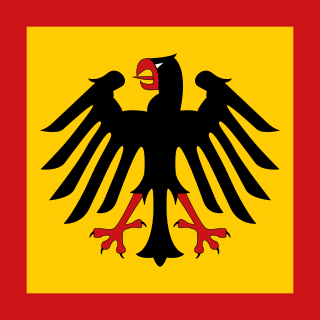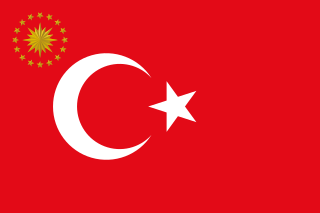
Politics in the Syrian Arab Republic takes place in the framework of a semi-presidential republic with nominal multiparty representation in parliament but with most opposition parties suppressed. President Bashar al-Assad, and his Arab Socialist Ba'ath Party have remained dominant forces in the country's politics since the 1970 coup d'état.

The president of Germany, officially the Federal President of the Federal Republic of Germany, is the head of state of Germany.

The president of Turkey, officially the president of the Republic of Türkiye, is the head of state and head of government of Turkey. The president directs the executive branch of the national government and is the commander-in-chief of the Turkish military. The president also heads the National Security Council.
A constitutional amendment is a modification of the constitution of a polity, organization or other type of entity. Amendments are often interwoven into the relevant sections of an existing constitution, directly altering the text. Conversely, they can be appended to the constitution as supplemental additions, thus changing the frame of government without altering the existing text of the document.

The Constitution of the Republic of Lithuania defines the legal foundation for all laws passed in the Republic of Lithuania. It was approved in a referendum on 25 October 1992.

Belarus elects on national level a head of state—the president—and a legislature. The president is elected for a five-year term by the people. The National Assembly has two chambers. The House of Representatives has 110 members elected in single-seat constituencies elected for a four-year term. The Council of the Republic has 64 members, 56 members indirectly elected and eight members appointed by the president.

The Australian republic referendum held on 6 November 1999 was a two-question referendum to amend the Constitution of Australia. The first question asked whether Australia should become a republic with a President appointed by Parliament following a bi-partisan appointment model which had been approved by a half-elected, half-appointed Constitutional Convention held in Canberra in February 1998. The second question, generally deemed to be far less important politically, asked whether Australia should alter the Constitution to insert a preamble. For some years opinion polls had suggested that a majority of the electorate favoured a republic. Nonetheless, the republic referendum was defeated, in large part due to division among republicans on the method proposed for selection of the president.

The Italian Parliament is the national parliament of the Italian Republic. It is the representative body of Italian citizens and is the successor to the Parliament of the Kingdom of Italy (1861–1943), the transitional National Council (1945–1946) and the Constituent Assembly (1946–1948). It is a bicameral legislature with 600 elected members and a small number of unelected members. The Italian Parliament is composed of the Chamber of Deputies, as well as the Senate of the Republic.

The Constitution of the Republic of Belarus is the ultimate law of Belarus. The Constitution is composed of a preamble and nine sections divided into 146 articles.

A seven-question referendum was held in Belarus on 24 November 1996. Four questions were put forward by President Alexander Lukashenko on changing the date of the country's independence day, amending the constitution, changing laws on the sale of land and the abolition of the death penalty. The Supreme Council put forward three questions on constitutional amendments by the Communist and Agrarian factions, local elections and the national finances.
A national referendum-plebiscite was held on October 16–17, 1976 in the Philippines in which the majority of the barangay voters approved the continuation of Martial Law and ratified the proposed amendments to the Constitution substituting the Regular Batasang Pambansa with the Interim Batasang Pambansa, pursuant to Presidential Decrees Nos. 991, 1031, and 1032.

A referendum on the method of the election of the president was held in France on 28 October 1962. The question was whether to have the President of the French Republic elected by direct popular vote, rather than by an electoral college. It was approved by 62.3% of voters with a 77.0% turnout. The reform was controversial because it strengthened the executive at the expense of Parliament, and because of the disputed constitutionality of the procedure used.

The Council of Ministers is the principal executive organ of the Government of Italy. It comprises the President of the Council, all the ministers, and the undersecretary to the President of the council. Deputy ministers and junior ministers are part of the government, but are not members of the Council of Ministers.

The Supreme Constitutional Court is the highest jurisdictional authority in the Syrian Arab Republic.

The judicial system of Syria is a synthesis of Ottoman, French, and Islamic laws. The civil, commercial and criminal codes are primarily based on the French legal practices. Promulgated in 1949, those laws have special provisions sanctioned to limit application of customary law among beduin and religious minorities. The Islamic religious courts continue to function in some parts of the country, but their jurisdiction is limited to issues of personal status, such as marriage, divorce, paternity, custody of children, and inheritance. Nonetheless, in 1955 a personal code pertaining to many aspects of personal status was developed. This law modified and modernized sharia by improving the status of women and clarifying the laws of inheritance.

A nationwide referendum was held in Moldova on 5 September 2010 on whether or not the country should amend the Constitution of Moldova to return to direct popular election of the president. Since 2001, the president had been indirectly elected by Parliament, with a supermajority of 61 seats required for election. The voters are asked to answer the following question: "Would you agree with the Constitutional amendment, which would allow the election of the President of the Republic of Moldova by the entire population?" Voters chose one of the proposed options: "Yes (for)" or "No (against)". Of those who had cast their vote, 87.83% chose "Yes". However, the referendum did not pass because only 30.29% of voters turned out, short of the necessary 33% for the referendum to be considered valid.
A non-binding constitutional referendum was held in Iceland on 20 October 2012. As a part of the 2010–2013 constitutional reform, and upon recommendation by the Constitutional Assembly, voters were asked whether they approved of six proposals included in a new draft constitution of Iceland. All six questions were approved by voters. The passing of Question 3 regarding the inclusion of a national church in the constitution was the only provision that went against the Constitutional Assembly's recommendations.
A referendum is a direct vote in which an entire electorate is asked to either accept or reject a particular proposal. This article summarises referendum laws and practice in various countries.
An Icelandic Constitutional Council (Stjórnlagaráð) for the purpose of reviewing the Constitution of the Republic was appointed by a resolution of Althingi, the Icelandic parliament, on 24 March 2011. Elections were held to create a Constitutional Assembly (Stjórnlagaþing) body, but given some electoral flaws, had been ruled null and void by the Supreme Court of Iceland on 25 January 2011, leading the parliament to place most of the winning candidates into a Constitutional Council with similar mission. The question of whether the text of the proposed constitution should form a base for a future constitution was put to a non-binding referendum, where it won the approval of 67% of voters. However, the government's term finished before the reform bill could be passed, and following governments have not acted upon it.

The 1973 Constitution of the Syrian Arab Republic was adopted on 13 March 1973 and was in use until 27 February 2012. It describes Syria's character to be Arab, democratic, and republican. Further, in line with pan-Arab ideology, it positions the country as a region of the wider Arab world and its people as an integral part of the Arab nation. It entrenched the power of the Arab Socialist Ba'ath Party, its Article's original 8 describing the party as "the leading party in the society and the state", even if Syria was not, as is often believed, a one-party system in formal terms.











